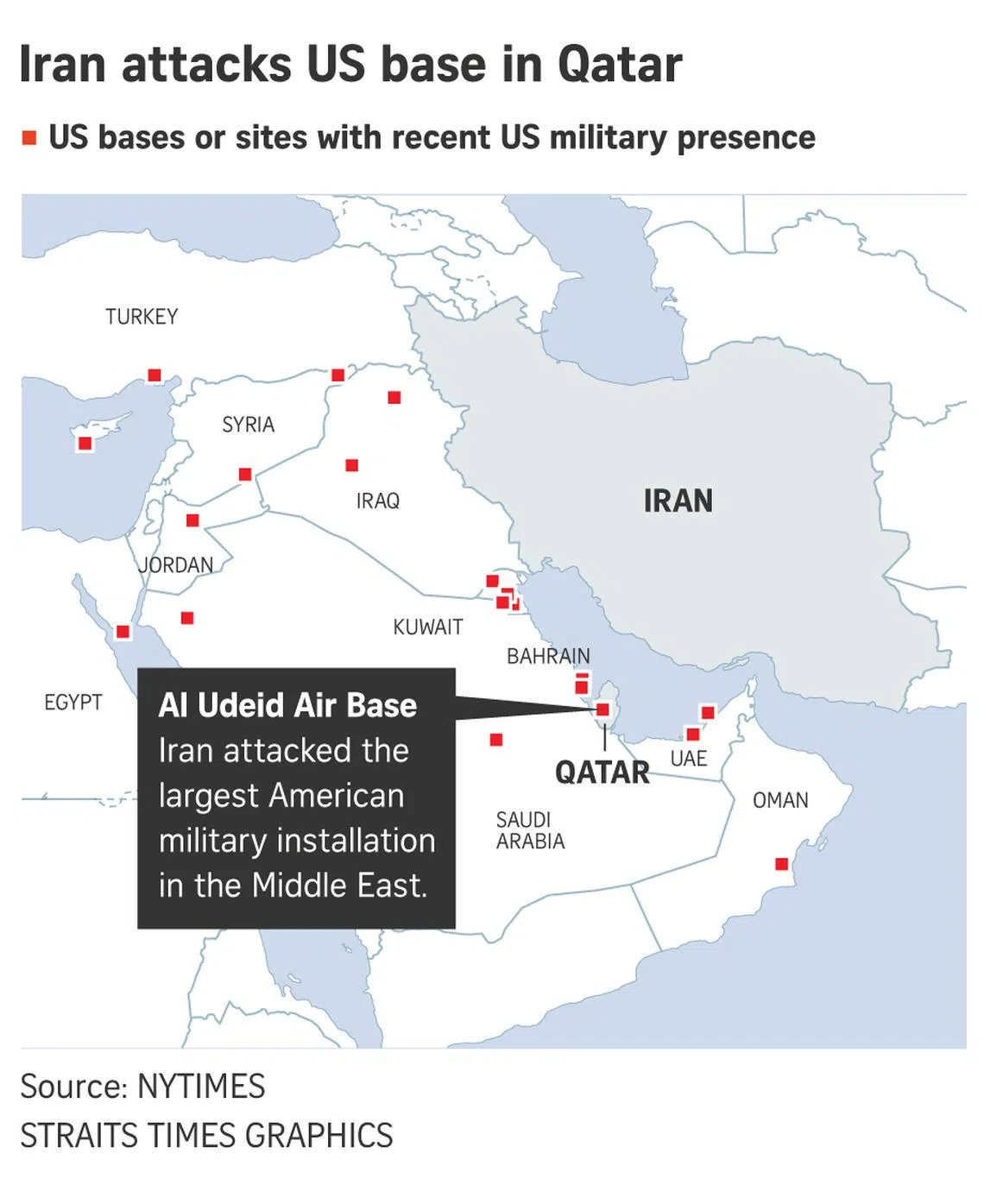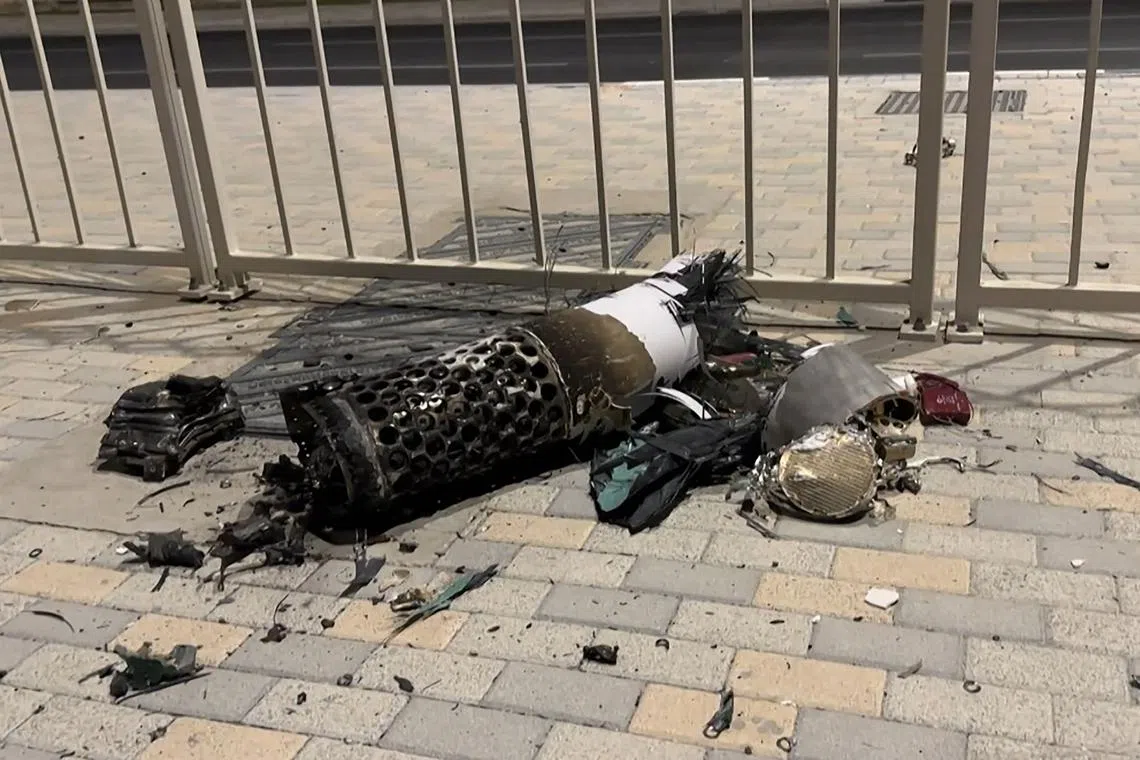Trump says Iran and Israel agree to a ‘complete and total’ ceasefire to end 12-day war
Sign up now: Get ST's newsletters delivered to your inbox
WASHINGTON/DOHA/ISTANBUL - US President Donald Trump announced on June 23 a “complete and total” ceasefire between Israel and Iran, potentially ending the 12-day war that saw millions flee Tehran and prompted fears of further escalation in the war-torn region.
But there was no confirmation from Israel, and the Israeli military said two volleys of missiles were launched from Iran towards Israel in the early hours of June 24.
Witnesses later heard explosions near Tel Aviv and Beersheba in central Israel. Israel media said a building had been struck and three people were killed in the missile strike on Beersheba.
Israel, joined by the United States on the weekend, has carried out attacks on Iran’s nuclear facilities, after alleging Tehran was getting close to obtaining a nuclear weapon.
“On the assumption that everything works as it should, which it will, I would like to congratulate both Countries, Israel and Iran, on having the Stamina, Courage, and Intelligence to end, what should be called, ‘THE 12 DAY WAR’,” Mr Trump wrote on his Truth Social site.
Iranian state television announced a ceasefire with Israel early on June 24, but it was not immediately clear if the ceasefire had taken effect.
While an Iranian official earlier confirmed that Tehran had agreed to a ceasefire, Foreign Minister Abbas Araghchi said there would be no cessation of hostilities unless Israel stopped its attacks.
Mr Araghchi said early on June 24 that if Israel stopped its “illegal aggression” against the Iranian people no later than 4am Tehran time (8.30am Singapore time) on June 24, Iran had no intention of continuing its response afterwards.
As the deadline approached, Israel was continuing to strike Iran with missiles in one of the most intense barrages of the war. After the deadline passed, Iranian state television announced a ceasefire but the Israeli military said that sirens had been activated in Israel because of a missile launch from Iran.
It is not unusual for two adversaries to exchange fire in the early hours of a ceasefire, before a total pause takes effect.
A senior White House official said Mr Trump brokered the deal in a call with Israeli Prime Minister Benjamin Netanyahu and Israel had agreed so long as Iran does not launch further attacks.
Mr Trump appeared to suggest that Israel and Iran would have some time to complete any missions that are underway, at which point the ceasefire would begin in a staged process.
Iran denies ever having a nuclear weapons programme, but Supreme Leader Ali Khamenei has said that if it wanted to, world leaders “wouldn’t be able to stop us”.
Israel, which is not a party to the international Non-Proliferation Treaty, is the only country in the Middle East believed to have nuclear weapons. Israel does not deny or confirm that.
Qatar’s Prime Minister Sheikh Mohammed bin Abdulrahman Al Thani secured Tehran’s agreement during a call with Iranian officials, an official briefed on the negotiations told Reuters on June 24.
US Vice-President J.D. Vance, Secretary of State Marco Rubio and US special envoy Steve Witkoff were in direct and indirect contact with the Iranians, the White House official said.

Neither Iran’s UN mission nor the Israeli embassy in Washington immediately responded to separate requests for comment from Reuters.
Hours earlier, three Israeli officials had signalled Israel was looking to wrap up its campaign in Iran soon and had passed the message on to the United States.
Mr Netanyahu had told government ministers whose discussions ended early on June 24 not to speak publicly, Israel’s Channel 12 television reported.
Markets reacted favourably to the news.
S&P 500 futures rose 0.4 per cent late on June 23, suggesting traders expect the US stock market to open with gains on June 24.
US crude futures fell in early Asian trading hours on June 24 to their lowest level in more than a week after Mr Trump said a ceasefire had been agreed, relieving worries of supply disruption in the region.

Remnants of an Iranian missile intercepted over Qatar, as it lies on a pavement on June 23.
PHOTO: AFP
End to the fighting?
There did not appear to be calm yet in the region.
The Israeli military issued two evacuation warnings in less than two hours to residents of areas in the Iranian capital Tehran, one late on June 23 and one early on June 24.
Israeli Army radio reported early on June 24 that alarms were activated in the southern Golan Heights area due to fears of hostile aircraft intrusion.
Earlier on June 23, Mr Trump said he would encourage Israel to proceed towards peace after dismissing Iran’s attack on an American air base that caused no injuries and thanking Tehran for the early notice of the strikes.
He said Iran fired 14 missiles at the US air base, calling it “a very weak response, which we expected, and have very effectively countered”.
Iran’s handling of the attack recalled earlier clashes with the United States and Israel, with Tehran seeking a balance between saving face with a military response but without provoking a cycle of escalation it cannot afford.
Tehran appears to have achieved that goal.
Iran’s attack came after US bombers dropped 30,000-pound bunker-busters on Iranian underground nuclear facilities at the weekend, joining Israel’s air war.
Much of Tehran’s population of 10 million has fled after days of bombing.
The Trump administration maintains that its aim was solely to destroy Iran’s nuclear programme, not to open a wider war.
“Iran was very close to having a nuclear weapon,” Mr Vance said in an interview on Fox News’ Special Report with Bret Baier.
“Now Iran is incapable of building a nuclear weapon with the equipment they have because we destroyed it,” Mr Vance said.
Mr Trump has cited intelligence reports that Iran was close to building a nuclear weaopon, without elaborating. However, US intelligence agencies said earlier in 2025 that they assessed that Iran was not building a nuclear weapon and a source with access to US intelligence reports told Reuters last week that that assessment had not changed.
But in a social media post on June 22, Mr Trump spoke of toppling the hardline clerical rulers who have been Washington’s principal foes in the Middle East since Iran’s 1979 Islamic Revolution.
Israel, however, had made clear that its strikes on Evin prison – a notorious jail for housing political prisoners – and other targets in Tehran were intended to hit the Iranian ruling apparatus broadly, and its ability to sustain power. REUTERS, NYTIMES


